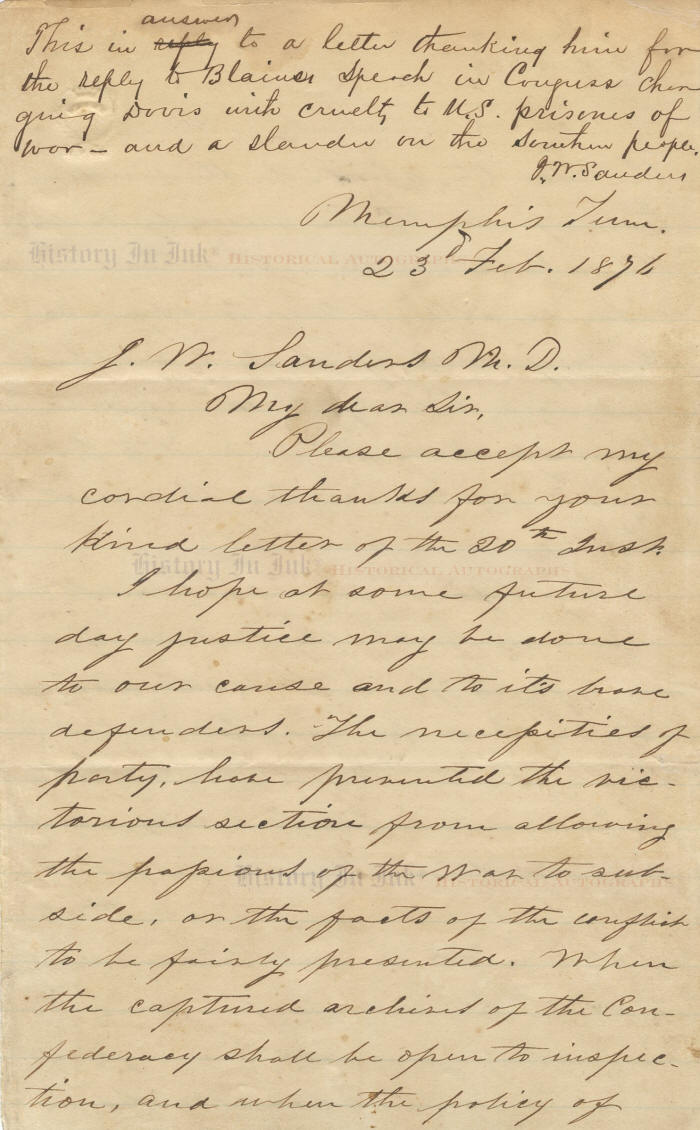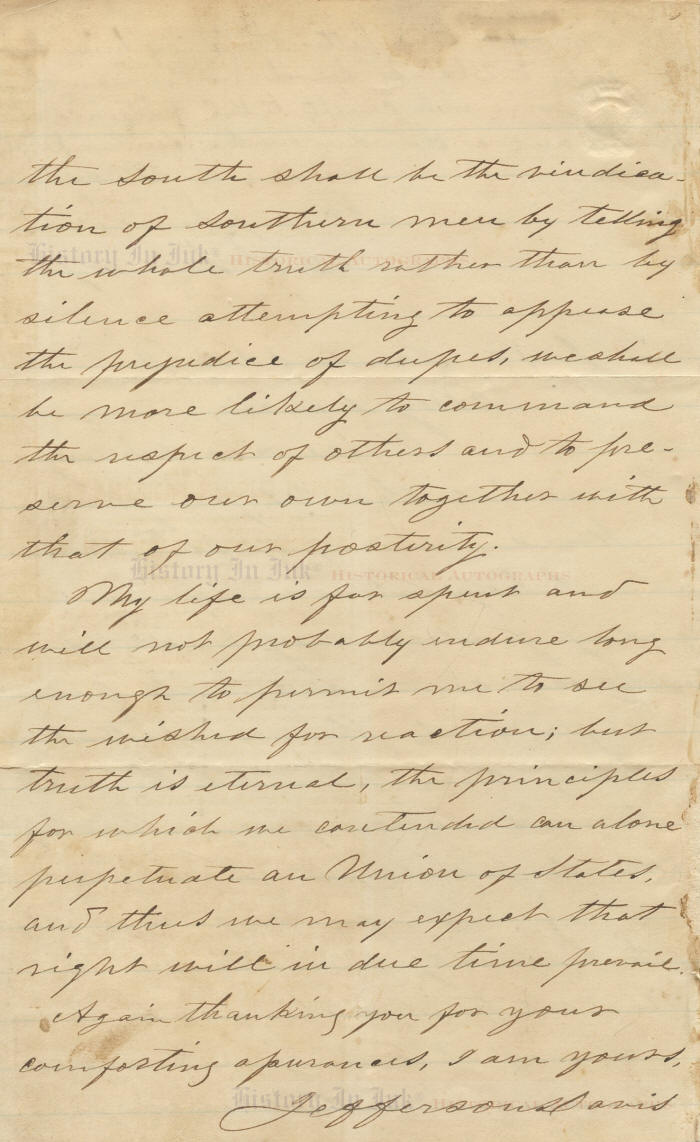


1410501
Jefferson Davis
". . . truth is eternal, the principles for which we contended can alone perpetuate
an Union of States, and thus we may expect that right will in due time prevail."
Jefferson Finis Davis, 1808-1889. President of the Confederate States of America; 1861-1865; United States Secretary of War, 1853-1857; United States Senator from Mississippi, 1857-1861. Superb Autographed Letter Signed, Jefferson Davis, two pages (front and back), 5" x 8", on embossed stationery, Memphis, Tennessee, February 23, 1876.
In this outstanding letter, which has never been offered on the autograph market before, an unrepentant Davis derides the "prejudices of dupes" while defending the Confederate cause of states' rights. He argues that "the policy of the south shall be the vindication of southern men by telling the whole truth rather than by silence" and concludes that "truth is eternal, the principles for which we contended can alone perpetuate an Union of States, and thus we may expect that right will in due time prevail.”
Davis replies to a letter from a South Carolina physician thanking him for responding to the vitriolic attack on him in the United States House of Representatives by James G. Blaine of Maine. Blaine held Davis responsible for the horrors of Andersonville Prison in Georgia. At Andersonville, which opened only in February 1864, some 13,000 of the 45,000 Union prisoners sent there died from scurvy, diarrhea, and dysentery brought on by starvation, overcrowding, filthy conditions, and disease before the prison was liberated in May 1865. In a trial lasting nearly two months, the commandant of Andersonville, Major Henry Wirz, was convicted of 12 prison murders and of conspiring and acting with others “to injure the health and destroy the lives of soldiers in the military service of the United States." The hated Wirz was one of only two Confederates, and the only regular Army officer, to be hanged for war crimes.
By 1876, some 21 years after the end of the Civil War, many former Confederates, mostly Democrats, had been elected to Congress. At least 60 of them had been generals in the Confederate Army. The Democrats resurrected a previously Republican bill, which had drawn little opposition, to restore the right to hold federal and state office to a group of about 750 former Confederate leaders who had not yet received amnesty. Section 3 of the Fourteenth Amendment, which was adopted in 1868, removed that right unless Congress restored it by a 2/3 vote of each house. The amnesty bill had been introduced before, when Blaine was the Speaker of the House under Republican control, and the House had passed it before it died in the Senate. By 1876, though, Blaine, one of the Republican leaders, wanted to be President and sought ways to keep himself in the public eye and energize the party's political base, particularly the Union war veterans in the Grand Army of the Republic.
So on January 10, Blaine surprised Republicans by offering an amendment to exclude Davis—and only Davis, “late president of the so-called Confederate States"—from amnesty. He sought to make Davis the issue in order to split the Northern Democrats from the Southern Democrats and to inflame the country's passions over the war in order to divert attention from the corruption of President Ulysses S. Grant's Republican administration.
In two days of debate on the House floor, Blaine went on the attack to waive the bloody shirt. One biography of Blaine described it as a speech “of extraordinary strength and audacity,” one of “vehemence almost amounting to fury." John Clark Ridpath & Selden Connor, Life and Work of James G. Blaine 129 (1893). Blaine called Davis “the author, knowingly, deliberately, guiltily, and willfully, of the gigantic murders and crimes at Andersonville." He argued that “neither the deeds of the Duke of Alva in the Low Countries, nor the massacre of Saint Bartholomew, nor the thumb-screws and engines of torture of the Spanish Inquisition begin to compare in atrocity with the hideous crime of Andersonville." Davis could have stopped the atrocity, he said, “by a wink of his eye, by a wave of his hand, by a nod of his head." He stressed “with great deliberation" that “there is not a government, a civilized government on the face of the globe . . . that would not have arrested Mr. Davis, and when they had him in their power would not have tried him for maltreatment of prisoners of war and shot him within thirty days." Speaking for the soldiers who died at Andersonville, he said, "I here protest, against their calling him back and crowning with full honors of full American citizenship the man who organized that murder." It was wrong, he argued, “to allow Davis to go free and hang Wirz."
Blaine had done precisely what Wirz had refused to do in order to save his own life. The night before Wirz was hanged, his lawyer told him that a high Johnson Administration cabinet officer had assured him that Wirz's sentence would be commuted to life in prison if Wirz would but implicate Davis in the Andersonville atrocities. An adamant Wirz replied, “I have always told you that I do not know anything about Jefferson Davis. He had no connection with me as to what was done at Andersonville. If I knew anything about him, I would not become a traitor against him or anybody else even to save my life."
Davis's reply to Blaine came through two letters. First, on January 22, 1876, he wrote Congressman J. Proctor Knott, a Democratic representative and chairman of the House Judiciary Committee, to urge passage of the bill with Blaine's amendment intact—giving amnesty to everyone but Davis himself. He said that “it may be proper to state that I have no claim to pardon, not having in any wise repented, or changed the convictions on which my political course was founded, as well before, as during, and since the war between the states." Second, on January 27, Davis wrote his supporter, former Confederate Congressman James Lyons of Virginia, who had written him three times urging him to respond to Blaine: “I have been so long the object of malignant slander and the subject of unscrupulous falsehood by partisans of the class of Mr. Blaine,” he said, “that, though I cannot say that it has become to me a matter of indifference, it has ceased to excite my surprise, even in this instance, when it reaches the extremity of accusing me of cruelty to prisoners." He argued that through Wirz's trial, the government had tried to prove Davis responsible but had been unable to do so. Blaine's speech, he said, was political: to further his own candidacy for the presidency. "The published fact of an attempt to suborn Wirz while under sentence of death, by promising him pardon if he would criminate me in regard to Andersonville prisoners, is conclusive as to the wish of the Government to make such a charge against me, and the failure to do so shows that nothing could be found to do so." Wirz's prosecutors, “with their trained band of suborned witnesses, dared not make against me this charge, which Wirz, for his life, would not make,” he said, “but which Blaine, for the presidential nomination, has made." He had refused to ask for a pardon from “the skulkers of the fight, like Blaine, who display their flag on an untented field,” and he said that he had “no view of the future which makes it desirable to me to be included in an amnesty bill." He argued that being pardoned for a great crime was the next thing to being punished for it, and he concluded by saying, “I am not willing to have it go over the earth, and down to posterity, that millions of my countrymen were pardoned traitors."
It is with this background that Davis wrote this letter to Dr. J. W. Sanders, a South Carolinian whose signed note at the top of this letter puts it into context. This letter, Sanders notes, was Davis's “answer to a letter thanking him for the reply to Blaine's speech in Congress charging Davis with cruelty to U.S. prisoners of war—and a slander on the Southern people." Davis writes, in full: “Please accept my cordial thanks for your kind letter of the 20th inst. / I hope at some future day justice may be done to our cause and to its brave defenders. The necessities of party, have prevented the victorious section from allowing the passions of the war to subside, or the facts of the conflict to be fairly presented. When the captured archives of the Confederacy shall be open to inspection, and when the policy of the south shall be the vindication of southern men by telling the whole truth rather than by silence attempting to appease the prejudices of dupes, we shall be more likely to command the respect of others and to preserve our own together with that of our posterity. / My life is far spent and will not probably endure long enough to permit me to see the wished for reaction; but truth is eternal, the principles for which we contended can alone perpetuate an Union of States, and thus we may expect that right will in due time prevail. / Again thanking you for your comforting assurances, I am yours . . . ."
We acquired this letter from a descendant of Dr. Sanders. We are pleased to be the first to offer it on the autograph market.
Davis has signed this letter with a large 3¼" signature. He has penned and signed in black ink, which has turned to brown over the years. The letter has two normal mailing folds, which touch the text but are not obtrusive. There are archival repair to a ¼" fold split on the margin of the lower fold and archival reinforcement to a weak corner bend at the upper right, neither of which affects the text or Davis's signature. The letter shows overall toning and some staining and light foxing. Overall it is in fine condition.
This is one of the finest post-war Jefferson Davis letters ever seen offered for sale. It boldly proclaims Davis's insistence that Confederate principles were right—a position Davis held until he died. Davisʼs January 22, 1876, letter to Congressman Knott mentioned above, which dispassionately set out his position, sold for $5,500 at Profiles In History's Historical Document Auction 52H, Lot 20, November 15, 2012. This letter is much better, because it more candidly and forcefully expresses Davisʼs view of the righteousness of the Confederacy and the political motives underlying what he viewed as his personal persecution. It belongs in the best of Civil War or Confederate history collections.
Unframed.
_____________
This item has been sold, but
click here to see other
American History items
that we are offering.



